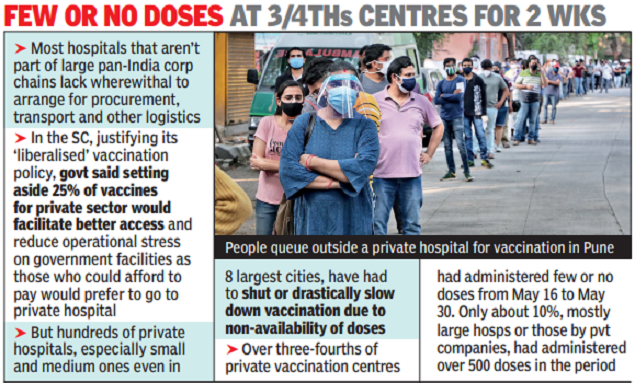Jabs opened to private hospitals to speed up drive, but number of giving shots down to 1/3rd | India News

As of end-April, there were around 5,000 private centres providing vaccines every day. Now, that number is down around 1,300 to 1,700 on most days; on Friday, for instance, 1,689 private vaccination centres were active, according to an analysis by TOI’s Insight Group.
In its affidavit in the Supreme Court justifying the “liberalised” vaccine policy, which envisaged a larger role for the private sector, the Centre had stated that setting aside 25% of vaccines for the private sector would facilitate better access and reduce the operational stress on government vaccination facilities from those who could afford to pay and would prefer to go to a private hospital. Yet, hundreds of private hospitals, especially small and medium ones even in India’s eight largest cities, have had to shut or drastically slow down vaccination due to non-availability of doses. They are too small to be able to deal directly with the manufacturers and place orders.
A comparison of the number of doses administered in private hospitals in the eight largest cities till May 30 shows that more than three-fourths of private vaccination centres had administered few or no doses since May 16. Only about 10% of the private centres had administered over 500 doses in this two-week period. Most of these were large hospitals, centres set up by corporate chain hospitals, and those set up in workplaces by private companies.
It isn’t just smaller hospitals and nursing homes that have had to stop vaccinating. Among those who did little or no vaccination over this two-week period are big hospitals like HCG and SMS hospitals in Ahmedabad; BGS Gleneagles and Baptist Hospital in Bengaluru; Billroth, Kamakshi Memorial and Vijaya in Chennai; Spinal Injuries Centre, Jaipur Golden, Shriram Bharti and Holy Family in Delhi; Kamineni Health Services, Virinchi and Medicover in Hyderabad; Belle Vue Clinic and Peerless Hospital in Kolkata; Hiranandani and K J Somaiya hospitals in Mumbai; and the Aditya Birla Memorial Hospital and Aundh Institute of Medical Sciences in Pune.
“We paid Rs 76 lakh on May 19 for 12,000 doses to SII. We were told the vials would be delivered by the end of May. Each time we follow up with the company, we are told that we will get our supply in due course of time. But no definite reason has been cited for the delay. We are confused,” said Sudipta Mitra, CEO of Peerless Hospitals in Kolkata.
In Delhi, Dr P K Bhardwaj of Saroj Hospital said things were fine as long as private hospitals were being provided doses by the government. But since May 1, after the liberalised vaccine policy kicked in, the hospital has not managed to get a fresh supply of vaccines.
Dr Giridhar Gyani of the Association of Healthcare Providers of India (AHPI) said that it has brought together 850 small and medium hospitals to place an order for vaccines. “We are being told by the vaccine companies that the government has to approve the list of hospitals for us to be provided vaccines. I don’t understand why we need any government approval when the government has already said that we can procure directly from the companies. After much negotiation, SII and BB have agreed to provide us with vaccines, but it is not going to happen before middle or late June,” said Dr Gyani. He added that AHPI has tied up with Vardhman Pharma, which has cold-chain facilities across the country, to store and deliver the vials to small and medium hospitals in smaller towns.
While AHPI might be able to help a few hundred hospitals in Tier 1 and 2 cities access vaccines, Dr Gyani is clear that private hospitals and nursing homes in more rural areas will not be able to access the vaccines. “The government will have to take care of vaccination in rural areas as it is not possible for us to arrange for delivery to such areas,” said Dr Gyani.
There are indications that some of the bigger hospitals that have had to halt vaccination are beginning to access some supplies. But a month’s time has been lost and even the future holds no assurance of regular supplies for many of them, say private hospital officials.


